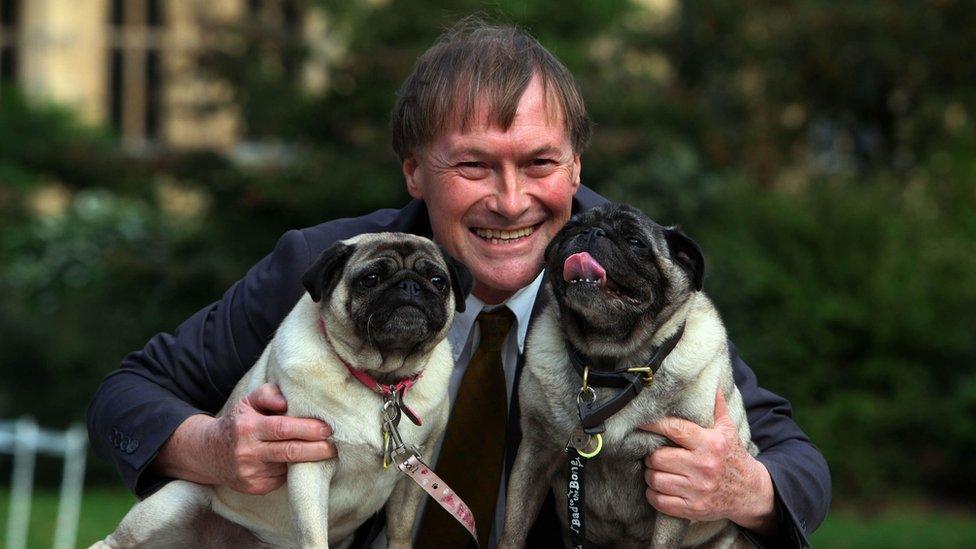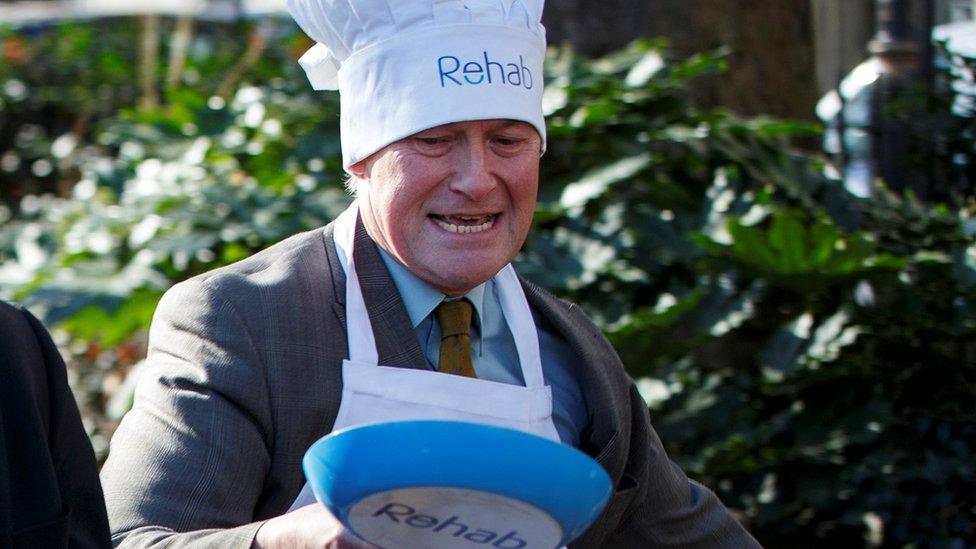Sir David Amess: Fun, friendly and always outspoken
- Published

Sir David Amess was one of Parliament's characters: fun, friendly, unconventional and outspoken.
His broad grin and boyish enthusiasm were fixtures in the House of Commons chamber for nearly 40 years.
He never scaled the heights of government, choosing to dedicate his career to his beloved Essex and the causes he cared about most. The 69-year-old was one of those rare MPs who earned cross-party respect for the conviction he brought to his opinions and campaigns. They ranged from passionate support of Brexit to animal rights - and anything that brought Essex up in the world.
He always took his work seriously, but himself rarely.
He was stabbed to death while in his constituency surgery in the seaside town of Leigh-on-Sea, an attack that has stunned his constituents and colleagues from across the political spectrum.
Sir David burst on to the political scene as the new MP for Basildon in 1983, the embodiment of what was known then as Essex Man, the archetypal aspirational voter who helped deliver a landslide victory for Margaret Thatcher that year.

A prominent animal lover within Westminster, David Amess regularly entered Parliament's dog of the year show
With an East End accent and relatively humble origins, he gained a high profile on TV and radio, and triumphed against the odds in the 1992 general election when he unexpectedly held on to his seat.
"My colleagues and supporters, go out and rejoice and celebrate!", he declared.
From that moment on David Amess was cheered by his Conservative colleagues every time he rose to his feet in Parliament, where he would rarely pass up the chance to mention Basildon.
He held the seat until 1997 when he realised the seat would be lost to Labour after boundary changes and switched his loyalty and devotion to nearby Southend West. For years he campaigned for Southend to become a city, mentioning it virtually every week in Parliament - he retweeted a BBC Essex tweet along these lines just a day before his death.
Sir David - who was married with five children - was also a devout Catholic.
He was socially conservative: he supported capital punishment and opposed abortion. He was an early Eurosceptic. He was also a strong supporter of animal rights, including a fox hunting ban, and he campaigned against fuel poverty, advocated tackling obesity and raised awareness of endometriosis, a painful gynaecological condition that some women suffer.
Although for many years he was a parliamentary aide to the former cabinet minister, Michael Portillo, he never held ministerial office; he was too unorthodox for that.

Sir David was a keen participant in the annual MPs' pancake race
Deputy prime minister Dominic Raab paid tribute to "a great common sense politician and a formidable campaigner with a big heart, and tremendous generosity of spirit - including towards those he disagreed with".
The SNP's Westminster leader Ian Blackford said he was "a thoroughly decent man".
His loss will be felt keenly in his Southend West constituency. Trembling with emotion Father Jeff Woolnough, parish priest of St Peter's Catholic church in Eastwood Road North, Leigh-On-Sea, told the BBC Sir David was a "great, great man, a good Catholic and a friend to all".
Born in Plaistow in 1952, he went to school in London and did many things before turning to politics.
He taught at a school in London before embarking on a career as a recruitment consultant. He did attract unwelcome publicity in 1997, when he was the victim of satirist Chris Morris on his Channel 4 show Brass Eye, when he was shown with other well-known figures condemning Cake, a made-up drug. Sir David said Channel 4 should feel "shame" for the programme, as it came soon after the case of his then-constituent 18 year old Leah Betts, who died after she took ecstasy.
He was one of those MPs who used Parliament to sponsor bills, to sit on committees, to form alliances, so that he could shape law from the backbenches.
As an animal welfare specialist, he led campaigns to ban cages for game birds and end the transport of live animals for export - and was a patron of the Conservative Animal Welfare Foundation. Sir David was what they call an old school parliamentarian - the epitome of a constituency MP who died serving those he was so proud to represent.